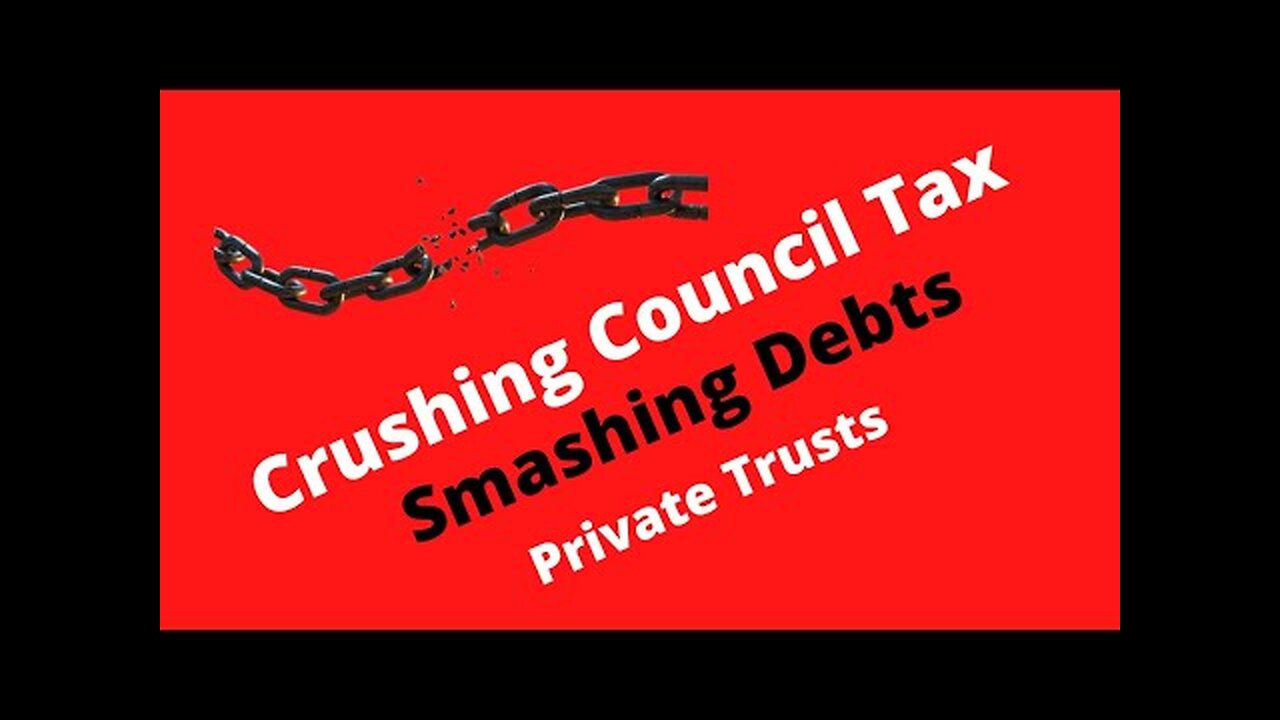Premium Only Content

Debt Smashing, Council Tax Remedy And Private Trusts
All my Links Below
https://linktr.ee/PeterWilsonReturnTo...
👉👉 Click HERE to order clean slate https://therootbrands.com/iamanpeter
Clean Slate heavy metal detox
The Council Tax Fraud
If you know the law and your rights the corporations that form the legal and financial system cannot intimidate or coerce you into doing something that isn’t lawful. If you do your research and stand in your power you can refuse to be coerced and there is nothing they can do about it.
Financial institutions, the legal system, and government have used personage and legal entrapment to enslave men and women by tricking us into registering our names as a corporate entity through the Certified Copy of an Entry (Birth Certificate), Drivers Licence, and Passport. We then believe that this ALL CAPS legal fiction with the title Mr/Mrs/Miss/Ms is actually us, so we unwittingly represent this implied corporation and therefore bear the burden of fines, taxes, tickets, and policies.
Their use constitutes an unlawful attempt to lower the status a man or a woman, which is above a public servant, to that of a PERSON, which is under a public servant. It also constitutes an unlawful attempt to gain jurisdiction, when no such jurisdiction exists, nor can it ever exist unless there is a provable cause where a man or woman has filed a verified claim (affidavit).
Together with the crime of personage or legal entrapment is another criminal activity known by the term ‘barratry’, which is a legal term in British case law that describes a criminal offence committed by people who are overly officious in instigating or encouraging prosecution of groundless litigation, or who bring repeated or persistent acts of litigation for the purposes of profit or harassment. Knowingly bringing false claims into court is something that the police, politicians, judges, and local councils are doing on a daily basis.
There is no obligation to acknowledge, believe, or adhere to written instruments such as Statutes, Acts, or Legislation authored by other men and women acting as public servants, unless you are property of the public servants who authored the foregoing written instruments. Since living men and women are not owned by the author of these documents or anyone accepting liability for these false statements, we have no obligation to contract with the author or anyone accepting liability for the false statement.
An obligation is a moral or legal requirement or duty; the act of obligating; or the state of being obligated. It is a legally enforceable agreement to perform some act, especially to pay money, for the benefit of another party. It is a legal bond by which one or more parties (the obligated) are bound to act, or indeed to refrain from acting, which is in essence a contract.
A contract is an agreement made by the mutual consent of two or more persons by their own free will.
In order to be legally binding a contract MUST have: Offer, Acceptance, Consideration, Full disclosure and be signed by two sentient living beings. Only a wo/man and another wo/man can sign a contract. A corporation cannot sign a contract with a wo/man.
Our duties, rights and obligations are created by such contracts and creating them without our agreement would be an act of force that is unlawful. Nobody has entered in any contract with their local council nor has anyone ever agreed to pay them.
Nobody can create an obligation for another man or woman without their permission. But that is exactly what your local council is doing when they send you a council tax bill.
When a corporation writes to you saying that you owe them money, always write back asking for verification of a contract with wet ink signatures, a true bill, and all of the material evidence to support their claim in the form of an Affidavit which means that a living man or woman must accept liability. Since there is no such contract, no bill that conforms to the Bill of Exchanges Act 1882, and no Affidavit (corporations can’t write them) the chances are that this won’t happen.
COUNCILS ARE CORPORATIONS
The first thing you can do is send an FOI request to the council asking for their DUNS Number, Company Number with Companies House, their ICO number, and their VAT registration number.
When you write to the council always quote their Dun & Bradstreet number – DUNS Number. Put it on the letter or notice you are sending under the name of the Chief Executive and the address on the left-hand side. Look up the number here: https://www.dnb.co.uk/duns-number/lookup.html
They will also be registered with Companies House in England & Wales. You can do a search here: https://www.gov.uk/get-information-about-a-company
If the result doesn’t come up try this search: https://companycheck.co.uk
Also look up their ICO registration number: https://ico.org.uk/about-the-ico/what-we-do/register-of-fee-payers/
As evidenced by the DUNS Number the council is a private, for-profit company charging for so-called ‘services’ (which have not been evidenced as consideration in any contract with us) and is therefore no different to McDonalds.
Under the Clearfield Doctrine, a Supreme Court Case, Clearfield Trust Co. v. United States, (1943) 318 US 363-371, when the State or government enters into commercial business it abandons its sovereign capacity and is to be treated like any other corporation. The Clearfield Doctrine strips the council of its “government” cloak and any protection that it offers. Therefore legislation that applies to all companies also applies to the council.
LEGISLATION
Profit is made from you by the way of legal (not lawful) fines from Legislation or Acts and
Statutes, utility bills, and the many different forms of taxation. Research the Data Protection Act 2018, the General Data Protection Regulation, the Law of Property Act 1925, sections 53, 136 and 196; and the Law of Assignment and Practice Directive 51U.
The burden of proof is on the council, because they are under a legal obligation to prove that we are under an obligation to comply with the councils command. Under section 34 (6) of The council Tax (Administration and Enforcement Regulations) 1992, the council is required to satisfy the courts of the following two presumptions:
the sum has become payable by the defendant
That any obligation has not been paid
https://www.legislation.gov.uk/uksi/1992/613/regulation/34/made
When explaining why you have to pay council tax, Local Councils will reference The Local Government Finance Act 1988/1992 stating that it ‘sets out the legal ability to administer and collect Non-Domestic Rates and council tax respectively’.
So here is the section to which they are referring:
Council tax in respect of dwellings.
(1) As regards the financial year beginning in 1993 and subsequent financial years, each billing authority shall, in accordance with this Part, levy and collect a tax, to be called council tax, which shall be payable in respect of dwellings situated in its area.
https://www.legislation.gov.uk/ukpga/1992/14/section/1
Here we can see that the legislation says a council can ‘levy and collect a tax’. So yes they are permitted to send out bills, however, it does not say that living men and women are required to pay council tax nor does it state that payment is obligatory or compulsory. There is no legal or equitable obligation to make payments to any council under the Local Government and Finance Act 1992.
The burden of proof is on the council to prove the payment is compulsory to their private company.
Section 1(1) of the Local Government Finance Act 1992 says it ‘shall’ be payable but where does it say when it is payable?
Councils will also say that ‘all persons have a duty to pay their council tax upon receipt of a council tax bill’. Indeed, the legislation states that ‘persons’ and ‘residents’ or ‘owners’ are required to pay council tax.
Persons liable to pay council tax.
(1) The person who is liable to pay council tax in respect of any chargeable dwelling and any day is the person who falls within the first paragraph of subsection (2) below to apply, taking paragraph (a) of that subsection first, paragraph (b) next, and so on.
(2)A person falls within this subsection in relation to any chargeable dwelling and any day if, on that day—
(a) he is a resident of the dwelling and has a freehold interest in the whole or any part of it;
(b) he is such a resident and has a leasehold interest in the whole or any part of the dwelling which is not inferior to another such interest held by another such resident;
(c) he is both such a resident and a statutory [F1, secure or introductory tenant]of the whole or any part of the dwelling;
(d) he is such a resident and has a contractual licence to occupy the whole or any part of the dwelling;
(e) he is such a resident; or
(f) he is the owner of the dwelling.
https://www.legislation.gov.uk/ukpga/1992/14/section/6
But what is a ‘person’ and what is a ‘dwelling’?
PERSON – DEFINITIONS IN LAW
Presumption of person: “Persons” are of two kinds, natural and artificial.
PERSONA-EST-HOMO-CUM-STATU-QUODAMONSIDERATUS. A person is a man considered with reference to a certain status.
A Natural Person is a man or woman considered according to the rank they hold in society, with all the rights to which the place held entitles him and the du-ties which it imposes.
HOMO-VOCABULUM-ESTNATURZE; PER- SONA-JURIS-CIVILIS. Man (homo) is a term of nature; person (persona) of civil law.
An Artificial Person is created and devised by human laws for the purposes of society and government as distinguished from Natural Persons.
Corporations are also “persons”. Persons include a collection or succession of natural persons forming a corporation. Every full citizen is a person and a ‘country’ is a person in a legal sense. Unless challenged it is presumed that you are a ‘person’, that is a fiction in the public, a subject of civil rights, duties, and obligations – such as paying fines and taxes.
The definition of a ‘person’ in Blacks Law Dictionary 1990 edition six is:
Person. In general usage, a human being (i.e. natural person), though by statute term may include labor organizations, partnerships, associations, corporations, legal representatives, trustees, trustees in bankruptcy, or receivers.
So in legal terminology, a ‘person’ may also be a ‘corporation’ in reference to statues and Acts. Therefore every Act is directed at a ‘person’ or ‘persons’.
Blacks Law Dictionary 1990 edition six goes on to describe ‘artificial persons’:
Artificial persons. Persons created and devised by human laws for the purposes of society and government, as distinguished from natural persons. Corporations are examples of artificial persons.
Various pieces of UK legislation include a definition of ‘person’:
The Bills of Exchange Act 1882, Section 2:
“Person” includes a body of persons whether incorporated or not.
https://www.legislation.gov.uk/ukpga/Vict/45-46/61/section/2
The Local Government Act 1888, Section 100
The expression “person” includes any body of persons, whether corporate or unincorporate.
https://www.legislation.gov.uk/ukpga/Vict/51-52/41/section/100
The Interpretation Act 1978, Schedule 1, “Words and expressions defined”;
“Person” includes a body of persons corporate or unincorporate. [1889]
https://www.legislation.gov.uk/ukpga/1978/30/schedule/1
Representation of the People Act 1983, Section 202, ‘General provisions as to
interpretation’:
“person” includes (without prejudice to the provisions of the M1Interpretation Act 1978) an association corporate or unincorporate;
https://www.legislation.gov.uk/ukpga/1983/2/section/202
So the meaning of the word person is different in legal usage than in standard English. A person is not what we think it is; it is in fact an association which can be corporate or unincorporate.
According to the UK Government website ‘An ‘unincorporated association’ is an organisation set up through an agreement between a group of people who come together for a reason other than to make a profit (for example, a voluntary group or a sports club). … Individual members are personally responsible for any debts and contractual obligations.’
https://www.gov.uk/unincorporated-associations
So in this sense a person that is unincorporated agrees to be responsible for debts and contractual obligations.
MEN & WOMEN
In contrast, Genesis 1:27 says that men and women are a creation of God:
‘So God created man in his own image, in the image of God created he him; male and female created he them.’ King James Version
Therefore a person is not a man or woman, nor a male or female.
A person is an invention of man as defined in the law created by man. A person was not created by God therefore, a person is not a man or woman.
Our entire system of taxation and fines is fake and has been designed as a commercial system that uses persons in commerce. A corporation cannot contract with a man or woman, they can only contract with another corporation, so they have invented the term ‘person’ so that they can unlawfully contract with men and women through implied consent.
The bills, the fines, the taxes are all directed at our legal fiction Mr/Mrs/Miss/Ms ALL CAPS name or straw-man, not at us. To avoid this fraud and to not allow them to commit the crimes of legal entrapment on us we need to comprehend that we are man and woman not a person or persons with titles and CAPITALIZED NAMES.
These things also belong to the wise. It is not good to have respect of persons in
judgment: Proverbs 24:23
For there is no respect of persons with God: Romans 2:11
REBUTTAL OF PRESUMPTION OF PERSON
I :name: formally challenge, rebut, revoke, and rescind the presumption of ‘Person’. I a wo/man am living, breathing, and of flesh and blood, who stands under Natural Law, and God, the creator, that was, is and ever shall be. I am a wo/man under God and I renounce any and all civil rights, duties, and obligations. It is by definition a presumption and has no standing or merit in presentable or material fact, therefore I do not consent. I a wo/man :name: remove any and all contracts, implied, expressed or Quasi. They are void ab initio “estoppel by contract”.
FREEDOM OF INFORMATION REQUESTS
FOI emails to the council can be used to access general information that is not personal to you. We need to separate out our requests into DSARs, which cover personal information, and FOI which covers information that should be available to any member of the public. Do not put general information request into a DSAR.
Example FOI Request
Under The Freedom of Information Act 2000 (FOIA) I would like to request proof of where the resident’s Council Tax payments are being spent.
1 – I am writing to request a copy of the expenditure statement for the year 2021 to 2022. I would like the full transactional list of all of the expenses paid by the council. I do not require the profit and loss spreadsheet. I do not want to see percentages but itemised proof in pounds (£s) as to where the annual council tax is being spent.
2 – I would like to know if my council tax funds the Police Service, Ambulance Service, waste collection and Schools.
3 – If the above services are being funded I would like to know the percentages for each.
You are respectfully reminded of the following guidance from the ICO:
Section 10 of the Act sets out the time frames within which a public authority must respond to an FOIA request.
It applies whenever the public authority has:
a duty under section 1(1)(a) confirm or deny whether the information is held;
a duty under section 1(1)(b) to provide information that is held to the requester;
a duty under section 17 to issue a refusal notice explaining why a request has been refused.
Authorities must respond to requests promptly, and by the twentieth working day following the date of receipt of the request.
A working day is any day other than a Saturday, Sunday, Christmas Day, Good Friday or a day which is a bank holiday under the Banking and Financial Dealings Act 1971 in any part of the United Kingdom.
Where required, an authority may claim a reasonable extension of time to consider the public interest test. An extension beyond an additional 20 working days should be exceptional.
Click to access time-for-compliance-foia-guidance.pdf
PERSONAL DATA
In 2019 the court of Appeal ruled that ‘no legal duty exists that requires a resident to notify a council of their residence at a particular address for council tax purposes’. This means that there is no legal obligation to provide any local council with any personal details.
The judge said that ‘the defendant appeared liable to pay council tax … but that cannot of itself, as we see it, connote that she was obliged in law to notify the council of her continued residence. The fact is, as we have said, that such a provision simply is not there, either within the primary legislation or in subordinate legislation made pursuant to the provisions of the 1992 Act itself.’
http://www.bailii.org/ew/cases/EWCA/Crim/2019/209.html
PAYMENTS
There is no law requiring anyone to pay any tax. There is no legal or equitable obligation to make payments to any council under the Local Government and Finance Act 1992. There is no obligation whatsoever to make payments to any council under any legislation whatsoever.
Legislation and Acts of Parliament use force to make claims upon us, but they are neither proof of claim or authority over us. Acts require our consent to be given the force of law, otherwise they are merely rules and regulations – not law. Living men and women must agree to these written instruments authored by our public servants for them to be of any relevance and hold any force.
For a corporation or company to say that we owe them money, without a contract is a blatant lie constituting trespass, forgery, fraud, barratry and identity theft. The council must prove an obligation to pay. The burden of proof is on the council to prove the payment is compulsory to their private company.
The council is under a legal obligation to prove that we are under an obligation to comply with the councils command, as detailed in Section 34(6) of The council tax (Administration and Enforcement) Regulations 1992, which requires the council to satisfy the courts the following two presumptions:
1) The sum has become payable by the defendant (you) and
2) That any obligation has not been paid.
The burden of proof is also on the local authority to demonstrate that it has complied with the rules of billing, as per the Bills of Exchange Act 1882; it is not upon us to show why we have not paid.
We should not be making payment to a private company without evidence of equitable consideration in the form of a legal contract, signed by two sentient beings. However, when we are presented with these fake bills, taxes, and fines, we should never refuse to pay them because that will only cause controversy, and the legal society thrive and prosper purely on the creation of controversy. By removing any controversy or argument, there is nothing for a judge or magistrate to deal with.
The easiest way to deal with this fraud is to always remember that the bills, fines, taxes etc are simply offers to contract. If you contract, then you have to pay. But rather than contracting, send them a counteroffer by way of a conditional acceptance. You then agree to pay any and all bills, fines, taxes etc in full upon receipt of a lawful contract; a commercial true bill and full and complete statement of accounts.
For clarity, a lawful contract must include full disclosure with nothing added or removed after being signed, consideration, meaning that both parties bring something to the table and all signatories get what they want from the contract, lawful terms and conditions laid out in simple English, plus the wet signatures of all contracting parties.
Halsbury’s laws of England: “The law is absolutely clear on this subject. There is no authority for administrative courts in this country and no Act can be passed to legitimise them because of the constitutional restraints placed upon her Majesty at her coronation. Her oath requires her to govern us according to our respective laws and customs, a vital part of which consists of the tripartite system of separation of powers between judiciary, parliament (legislature) and executive. The collection of revenue by administrators is extortion, and extortion has been found reprehensible since ancient times”.
DIRECT DEBIT RECLAIM
Direct Debit Reclaim (DDR). After you have cancelled your Direct Debit phone your bank and claim back all the payments. Go here for the full explanation: https://awakenedgb.wordpress.com/2022/02/10/the-direct-debit-guarantee/
The council can reverse your indemnity claim depending on which one of the eight Indemnity Claim reasons you gave. The bank will inform the council and give them nine days to challenge the claim and provide the relevant proof. After 14 working days, or if the bank hears nothing, or if the challenge was not successful then the bank take the money out of the company’s account.
If a reversal isn’t successful the council may try to pursue you for arrears using their standard threats of court summons.
COURT SUMMONS Options on receipt of a summons:-
Go in to court and ask for a proof of obligation/valid contract which they won’t have.
Ignore and deal with the debt collectors at the door – they give up after a while.
Go to court. They will try to negotiate with you outside the court – make an offer of £20 per month
Write a notice of rejection of offer and rebut the summons – ask which valid court has sent this/which judge etc.
The court summons for council tax is fabricated by the council and issued by the council, it is not a proper summons issued by a magistrates court and is therefore not on the court system.
We know that a magistrates’ court handles criminal cases; and that debts are not a criminal matter but a civil matter. Civil matters are heard in county courts. So the fact that a civil matter is being heard in a criminal court is the first clue that there is something wrong. They can’t hear it in a civil court which is responsible for money disputes because they would have to provide the evidence that a contract or agreement was broken, which, of course, they can’t because they can’t provide proof of claim.
Pursuant to the Magistrates’ Court Act 1980, a justice of the peace issues a summons and signs it so that the individual can answer to the complaint.
I read through a council tax summons and noticed that:
the name of the court is not mentioned on the summons
the name of the individual at the court who issued the summons as recorded by the designated officer is not mentioned
there is no court seal
there is no signature of the Clerk, Magistrate, or the Justice of the Peace.
the envelope the summons was sent in has the unique franking machine die number of the council printed next to the postage amount.
court documents do not have barcodes. Barcodes are produced by the council to track documents from their bulk processing centre.
SIGNATURES
A court summons requires a signature. Send an FOI request to the alleged court asking them how you can identify an authentic summons.
STEPS TO TAKE ON RECEIPT OF A COUNCIL TAX SUMMONS
Phone the court.
If you phone up the magistrates court directly an ask them if they have any criminal matters before them in your name and ask for the case file numbers and the name of the case progression officer at the court. They will confirm that their system doesn’t have any record of any criminal cases in your name.
Send the court a DSAR
You can back this up by sending a DSAR asking for the personal data that they hold on you.
The summons for council tax has a ‘summons number’ which is not shown on an authentic magistrates court summons. If you ask for further details from the magistrates’ court regarding this number they will say it was issued by the council and refer you back to them.
An authentic court summons issued by a magistrates’ court shows the following:
the case number
the born date of the defendant
the date and time of the hearing (you will not be required to ‘make an appointment’
the name of the court and the number of the court room where the hearing will be held
the name of the Justices Clerk issuing the summons
a summary of the case against the defendant
The correct process should follow the Civil Procedure Rules (CPR) https://www.justice.gov.uk/courts/procedure-rules/civil and the official guidance in the magistrates’ court Act 1980, Section 51.
The Civil Procedure Rules (CPR) state that official documents, such as a claim form stating the amount being claimed, must be sealed by the court.
PART 2 – APPLICATION AND INTERPRETATION OF THE RULES
2.6 court documents to be sealed
The court must seal(GL) the following documents on issue –
(a) the claim form; and
(b) any other document which a rule or practice direction requires it to seal.
(2) The court may place the seal(GL) on the document –
(a) by hand; or
(b) by printing a facsimile of the seal on the document whether electronically or otherwise.
(3) A document purporting to bear the court’s seal(GL) shall be admissible in evidence without further proof.
https://www.justice.gov.uk/courts/procedure-rules/civil/rules/part02
The magistrates’ court records should contain:
the original complaint against you
a copy of the official court Summons produced by the court and signed by the Clerk of the Justice of the Peace
the case file which you are entitled to access for the information about your case
the name of the case progression officer.
However, according to the Magistrates’ Courts (Amendment) Rules 2019 (SI/2019/1367) Rule 7, the requirement for a signature on a summons or warrant is removed if there is a record of issue. So there still needs to be a paper trail at the court even if there isn’t a signature.
The summons is accompanied by a notice headed with the logo of HM Courts & Tribunals Service which is fraudulent under the Fraud Act 2006, Section 2 (1) False Representation and Section 11, obtaining services dishonestly. https://www.legislation.gov.uk/ukpga/2006/35/contents
Pursuant The Local Government Act 1888, section 78 (2) (a), a council is not a court and does not have powers to act as a court. https://www.legislation.gov.uk/ukpga/Vict/51-52/41/section/78
The employees responsible for draughting and issuing fabricated court summons documentation may be committing fraud pursuant to the Fraud Act 2006, Section (1) and (2), and Section (4), which carries a penalty of imprisonment.
If it is found that the council is impersonating a court we can take our case to the High Court because individuals at the council are committing an offence by breaking legislation.
DSAR 1 to the Court
Under DPA 2018 and GDPR 2018 I am writing to request a copy of the data that xxx court hold about me on their system.
Have you any knowledge that my information has been given to the court by any company claiming to be taking me to court? If so please can you give me the details.
I attach my proof of ID and residency. Thank you
DSAR 2 to the Court
If they come back with nothing send a second DSAR with the summons number and ask for the above details relating to it. They will write back saying that they don’t hold any data on their system because it is related to Council Tax and that you should contact the council directly. This is confirmation that the council is issuing the summons and fraudulently claiming it is from the court. The court is complicit in this deception.
DSAR to Ministry of Justice
You can also send a DSAR to the Ministry of Justice, 102 Petty France London. Please provide the data and information contained in the court management files relating to me.
DSAR to the Council
The burden of proof is on the council so you can also send them a DSAR for proof of the documents and proof of claim supplied by the council to the court in their application.
You can also send an FOI request asking for the court rules or legislation that they are following which supports their claim.
FOI to the Court & Council
We are confused as to why XYZ Council is sending a summons for a magistrates court for council tax when it is a criminal venue?
It is our understanding that debts are a civil cases and are always heard in a county court.
A magistrates court is a criminal court for summary offences such as traffic, assault or either-way offences such as theft and handling stolen goods.
A summons for an alleged debt is usually a civil matter held in a County Court. Since a council tax summons hearing is held in a criminal venue (XYZ Magistrates Court) yet is civil in nature; please confirm the jurisdiction of the court and which legislation and court rules apply.
Since a council tax application for a liability order is held in a criminal venue, yet in nature is a civil matter, please confirm the jurisdiction of the court and which legislation and CPR rules apply to those hearings.
Case Law
Regina v Brentford Justices, Ex parte Catlin [1975] QB 455
“A decision by magistrates whether to issue a summons pursuant to information laid involves the exercise of a judicial function, and is not merely administrative.”
“…. It must however be remembered that before a summons or warrant is issued the information must be laid before a magistrate and he must go through the judicial exercise of deciding whether a summons or warrant ought to be issued or not. If a magistrate authorises the issue of a summons without having applied his mind to the information then he is guilty of dereliction of duty and if in any particular justices’ clerk’s office goes on a practice goes on of summonses being issued without information being laid before the magistrate at all, then a very serious instance of maladministration arises which should have the attention of the authorities without delay….” – Lord Justice Widgery.
Read more @ https://awakenedgb.wordpress.com/2023/04/11/the-council-tax-fraud/
-
 25:22
25:22
Forrest Galante
7 hours agoPrivate Tour of Australia’s Best Aquarium
40.2K3 -
 2:07:09
2:07:09
BlackDiamondGunsandGear
13 hours ago🔴 LIVE SHOW w/ DLD & Okayest Shooter
29.1K2 -
 4:32
4:32
TruthStream with Joe and Scott
5 days agoTo Unite Music Video 2025 in 432 HZ written by Joe Rosati & Steve Collins. featuring Stephen Tenner, Kristen Capolino and KC Sunshine. Produced by Lewis Herms
55K13 -
 3:09:13
3:09:13
Joker Effect
16 hours agoFIRST EVER AMATEUR BOXING EVENT STREAMED ON RUMBLE! BOUGHT TO YOU BY WOLFSDEN BOXING!
81.2K11 -
 3:33:13
3:33:13
Barry Cunningham
12 hours agoTHE DOGEFATHER & THE DON! HOW ELON MUSK & PRESIDENT TRUMP ARE SAVING AMERICA!
138K112 -
 6:55:08
6:55:08
Phyxicx
11 hours agoGetting ready for $350 tournament! - 5/31/2025
30.3K -
 5:28:16
5:28:16
Tommy's Podcast
9 hours agoE742: Atomic Piledriver
40.8K2 -
 3:54:51
3:54:51
Mally_Mouse
19 hours agoSpicy Saturday!! - Let's Play: Group Games w/Friends!
87.9K3 -
 8:11
8:11
Warren Smith - Secret Scholar Society
9 months ago $8.69 earnedThe Professor who Does Not Fear YouTube
50.8K14 -
 3:27:21
3:27:21
megimu32
9 hours agoSATURDAY NIGHT HANGING + GAMING!! ..who am I?
15K4